|
|
|
Sort Order |
|
|
|
Items / Page
|
|
|
|
|
|
|
| Srl | Item |
| 1 |
ID:
152930
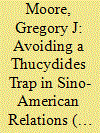

|
|
|
|
|
| Summary/Abstract |
In 2015, Harvard’s Graham Allison wrote an evocative article discussing the “Thucydides Trap” in relations between China and the United States, highlighting the danger of war between a rising power and a reigning power in the international system. Can China and the United States avoid the Thucydides Trap as China rises? This analysis identifies and analyzes seven reasons China and the US might not be able to avoid the trap: the bilateral strategic trust deficit, lack of agreement on the nature of the US pivot, recent trends in China’s maritime policies, disagreements over cyber security, security dynamics underlying China’s Anti-Access/Area Denial and Washington’s AirSea Battle strategies, recent trends in Sino-Russian strategic alignment, and Washington’s concerns about China’s increased defense spending.
|
|
|
|
|
|
|
|
|
|
|
|
|
|
|
|
| 2 |
ID:
159167
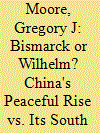

|
|
|
|
|
| Summary/Abstract |
The choice facing China today is whether it will follow the precedent set by Otto von Bismarck—which appears to be its stated goal—or whether it will (intentionally or unintentionally) follow the path of another German leader, Kaiser Wilhelm, and pursue a policy of military growth, territorial and/or maritime expansionism, and a relative disregard for the concerns of its neighbors. The South China Sea will be an important test case, an arena where China's choices will impact its relations with its neighbors and other great powers like the United States.
|
|
|
|
|
|
|
|
|
|
|
|
|
|
|
|
| 3 |
ID:
123705
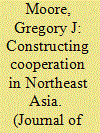

|
|
|
|
|
| Publication |
2013.
|
| Summary/Abstract |
What are the obstacles to greater cooperation in Northeast Asia and why have the nations of the region not been entirely successful in moving beyond history, toward greater cooperation? Conducting a brief survey of Northeast Asian IR and power alignment patterns from the Imperial/Dynastic era to the present, this essay utilizes the constructivist approach to assess regional alignment patterns in Northeast Asian history corresponding to six historical time periods, ranging from Ming China to the present. It does so by employing Wendt's system-level cultures of anarchy (Hobbesian, Lockean and Kantian cultures) at the dyadic/second level of analysis and the regional level of analysis (level 2.5), rating the various eras as to levels of cooperation vs enmity, with an eye to identifying the reasons for today's tension points. It concludes that despite such tension points and unresolved historical issues, anarchy in Northeast Asia today is not Hobbesian (enmity), but rather Lockean (rivalry). Consequently and first, war, nuclear proliferation and security spirals may be avoidable with proper sensitivity to the issues that continue to pose as obstacles to regional cooperation, including historical grievances, uncertainties over China's rise and the US role in the region, the North Korean nuclear issue and others. Second, attention to improving the dyadic cultures (China-Japan, South Korea-North Korea, etc.) that together comprise the region's relational culture (either Hobbesian, Lockean or Kantian) make greater regional cooperation possible and even more likely.
|
|
|
|
|
|
|
|
|
|
|
|
|
|
|
|
| 4 |
ID:
136161
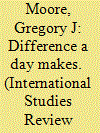

|
|
|
|
|
| Summary/Abstract |
Late on June 3, 1989, and into the next day Chinese soldiers brought to an abrupt end the 7-week standoff between the Chinese state and students and citizens of Beijing. It has been common to see balance of power considerations as bringing China and the United States together in 1972 to balance against the Soviet Union, and it has been equally common to see the end of what Kissinger called the Sino-American “tacit alliance” (1972–1989) to be, naturally, the end of the Cold War and/or the breakup of the Soviet Union. Borrowing from Hopf's societal constructivism (2012) and Wendt's “cultures of anarchy” (1999) here applied at the second level of analysis, the following study concludes that June 4 was actually key to the end of the Sino-American “tacit alliance,” leading to a major shift in mutual perceptions, which caused a shift in the Sino-American dyadic culture, from that of trusted friends to that of distrusted adversaries for a season, effectively ending the “tacit alliance” between the US and China.
|
|
|
|
|
|
|
|
|
|
|
|
|
|
|
|
| 5 |
ID:
092618
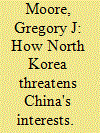

|
|
|
| 6 |
ID:
131258
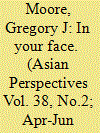

|
|
|
|
|
| Publication |
2014.
|
| Summary/Abstract |
While China's rising power is certainly an important variable in Sino-Japanese relations, it cannot explain either why the Diaoyu/Senkaku Islands dispute broke out anew in the fall of 2012 or why the Chinese response was so strong. China read Japan's move to nationalize the islands as an in-your-face move designed to show disrespect for China and make Japan's sovereignty over the islands a fait accompli. In this article I borrow from Robert Putnam's notion of twolevel games to argue that there are two levels of face politics going on in this case: one between domestic actors in Japan and in China, the other between the two countries. A solution to the territorial dispute can only be found when both sides' "face needs" are recognized and met at both levels of analysis.
|
|
|
|
|
|
|
|
|
|
|
|
|
|
|
|
| 7 |
ID:
159162
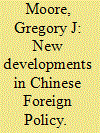

|
|
|
| 8 |
ID:
095589
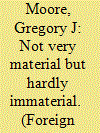

|
|
|
|
|
| Publication |
2010.
|
| Summary/Abstract |
In 1999 Sino-American relations experienced intense strain as a result of NATO's Kosovo intervention, and in particular by the bombing of the Chinese Embassy in Belgrade by an American B-2 bomber. Why did the bombing of China's embassy in Belgrade in the spring of 1999 touch such a raw nerve among the Chinese people and leadership? With the coming of the tenth anniversary of these events, what still needs to be explained is how Chinese and Americans could draw such divergent conclusions about that which they've never disagreed on-the incontestable fact of the embassy's demolition-and how the fact that what Americans called "a mistake" could almost completely derail Sino-American relations, which President Clinton in his very successful visit to China a year before had called a "strategic partnership." Based on a series of semistructured interviews the author did in Beijing and Washington with 28 Chinese and 30 American experts, this research draws a number of important conclusions in this regard. First, intensifying and even defining the conflict were a number of important perceptual gaps. Second, given the dispute over the intentionality of the embassy bombing, the conflict boiled down not to clashing interests, per se, but rather to issues of trust and beliefs about motives and intentions. Third, poor handling of the embassy bombing by both governments deepened the conflict and the alienation both sides felt. Fourth, underlying the lack of trust and the perceptual gaps between the two sides was "Fundamental Attribution Error.
|
|
|
|
|
|
|
|
|
|
|
|
|
|
|
|
| 9 |
ID:
145104


|
|
|
|
|
| Summary/Abstract |
What explains China's fixation on Taiwan? With a focus on the 1995–1996 Taiwan Strait Crisis as case, this study has led to the finding that “sacred commitments” explains far more about China's fixation on Taiwan than balancing or Taiwan's strategic significance, and its interests in Taiwan cannot be understood without taking its socially constructed “sacred commitments” to Taiwan into account. The theoretical implications of this study are that contrary to the conventional understanding of Chinese foreign policy as Realist in orientation, as it regards this case Realism was not particularly helpful, for the sorts of factors Realism “majors in” were not key to understanding China's Taiwan policy. The policy implications are that though the situation across the Taiwan Strait is calm at present, American policymakers must be absolutely clear that China's interests in Taiwan are unwavering and are not based on more pragmatic realpolitik considerations, but on “sacred commitments.”
|
|
|
|
|
|
|
|
|
|
|
|
|
|
|
|
|
|
|
|
|